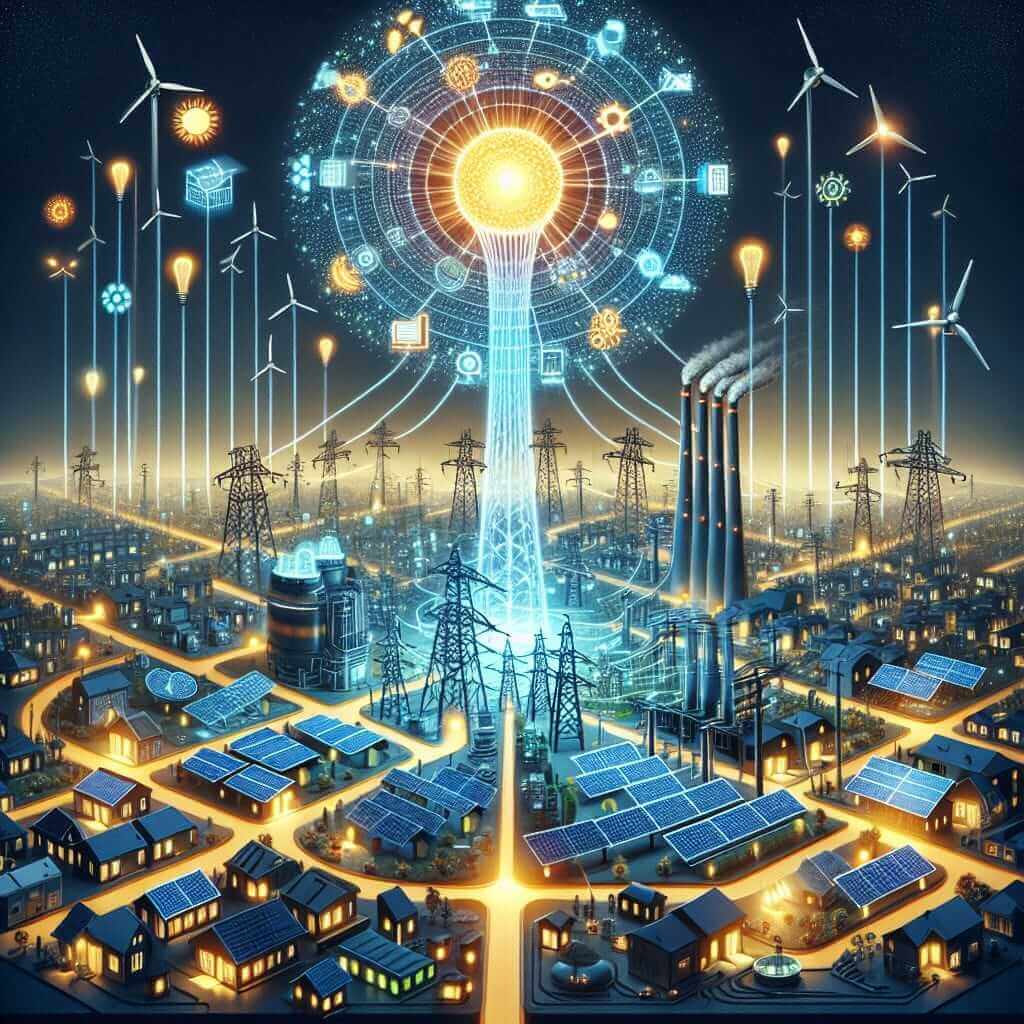The IELTS Reading section is often challenging for test-takers, particularly when it involves complex and timely topics like AI transforming the global energy sector. Understanding such topics can give test-takers an edge in their preparation by becoming familiar with current trends and the language used around them. With data showing the rising importance and recurrence of subjects related to technology and energy in recent IELTS exams, it’s prudent to delve into this intersection.
Reading Passage: How is AI Transforming the Global Energy Sector?
The Reading Passage
The global energy sector is undergoing a monumental transformation, and Artificial Intelligence (AI) is at the forefront of this revolution. By leveraging complex algorithms and vast amounts of data, AI is enabling more efficient, reliable, and cleaner energy production and consumption.
AI applications in the energy sector are diverse and multifaceted. For instance, predictive maintenance uses AI algorithms to foresee equipment failures before they occur, reducing downtime and maintenance costs. Similarly, AI-powered smart grids adjust electricity distribution in real-time, optimizing energy use and reducing waste.

Moreover, AI facilitates the integration of renewable energy sources into the grid. Solar and wind power are intermittent, but AI algorithms can predict their output with remarkable accuracy, allowing for better planning and storage solutions. This capability is crucial as the world shifts towards sustainable energy sources to combat climate change.
In addition to operational efficiencies, AI is driving innovation in energy storage technologies. Advanced machine learning models are optimizing battery usage and enhancing the capacity and lifespan of storage devices, critical for stabilizing the grid and ensuring a constant energy supply.
However, the implementation of AI in the energy sector is not without challenges. Issues such as data security, integration with existing infrastructure, and the need for skilled personnel present significant hurdles. Nevertheless, the benefits far outweigh the drawbacks, making AI an indispensable tool in the quest for a sustainable energy future.
Questions
Multiple Choice
-
What is one major benefit of AI in the energy sector?
- A) Increasing fossil fuel consumption
- B) Predictive maintenance to reduce downtime
- C) Higher operational costs
- D) Less reliable energy production
-
How does AI help in integrating renewable energy sources into the grid?
- A) By reducing energy storage capacity
- B) By using AI algorithms to predict energy output
- C) By relying solely on fossil fuels
- D) By lowering the accuracy of energy predictions
True/False/Not Given
- AI in the energy sector focuses solely on renewable energy.
- Advanced machine learning models are not useful for enhancing the capacity of energy storage devices.
- Data security is a concern when implementing AI in the energy sector.
Matching Information
Match the following AI applications with their descriptions:
-
Predictive Maintenance
-
Smart Grids
-
Renewable Energy Integration
-
Energy Storage Optimization
A) Adjusting electricity distribution in real-time
B) Foreseeing equipment failures before they occur
C) Enhancing the capacity and lifespan of storage devices
D) Predicting the output of solar and wind power accurately
Answer Key and Explanations
Multiple Choice Answers
-
B) Predictive maintenance to reduce downtime
- Explanation: AI algorithms forecast equipment failures, thus decreasing downtime and maintenance expenses.
-
B) By using AI algorithms to predict energy output
- Explanation: AI helps anticipate the output from renewable sources, aiding in planning and storage solutions.
True/False/Not Given Answers
-
False
- Explanation: AI is used for various applications beyond just renewable energy in the energy sector.
-
False
- Explanation: Advanced machine learning models enhance both the capacity and lifespan of energy storage devices.
-
True
- Explanation: Data security remains a significant concern when deploying AI technology.
Matching Information Answers
- B) Foreseeing equipment failures before they occur
- A) Adjusting electricity distribution in real-time
- D) Predicting the output of solar and wind power accurately
- C) Enhancing the capacity and lifespan of storage devices
Common Mistakes
When tackling reading passages similar to the one above, test-takers often make the following mistakes:
- Misinterpreting the main idea due to complex sentence structures.
- Overlooking specific details mentioned in the passage.
- Confusing similar-sounding terms and their implications within the context.
Vocabulary
- Intermittent (adj) /ˌɪntərˈmɪtənt/: Not continuous or steady.
- Example: “Intermittent” energy sources like wind and solar power require improved storage solutions.
- Optimize (v) /ˈɑːptɪmaɪz/: Make the best or most effective use of a situation or resource.
- Example: AI optimizes energy distribution to minimize waste.
- Indispensable (adj) /ˌɪndɪˈspɛnsəbl/: Absolutely necessary.
- Example: AI is indispensable in modern energy management.
Grammar Point
Present Continuous Tense for Ongoing Actions
- Structure: Subject + am/is/are + verb-ing
- Usage: Describes actions that are currently happening.
- Example: “AI is transforming the global energy sector.”
Conclusion
To excel in the IELTS Reading section, focusing on timely and relevant topics like how AI is revolutionizing the global energy sector can be immensely beneficial. Practicing with passages and questions around such topics not only enhances reading skills but also builds familiarity with current global trends. Remember to consistently engage with diverse reading materials and question types to improve comprehensively.
Tips for IELTS Reading Success
- Regular Practice: Daily reading practice with varied topics helps in improving comprehension and speed.
- Keyword Identification: Focus on identifying keywords in questions and matching them to the passage efficiently.
- Time Management: Allocate specific times to each section of the reading test to ensure that you can complete it within the given time.